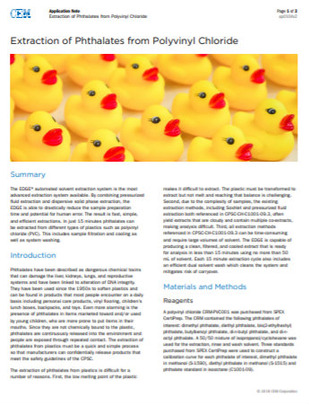
Energised Dispersive Extraction is a rapid and straightforward extraction process for sample preparation. Uses include the extraction of semi-volatile organic compounds from soil, fat from food and phthalates from plastics.
CEM have produced an application note outlining just how simple the extraction of phthalates from plastics can be using their EDGE system, which employs Energised Dispersive Guided Extraction (EDGE).
Phthalates are the most widely used plasticisers in the plastics industry. They have, however, been linked to liver, kidney, lung and reproductive system damage, and they are of particular concern when used in goods aimed at children.
The extraction of phthalates from plastics should therefore be simply and rapidly achievable to allow manufacturers to easily produce products that meet established safety guidelines for phthalate levels. Phthalate extraction can be difficult though because of the low melting points of many plastics, the problem of obtaining a pure extract and the time and solvent consuming nature of conventional extraction procedures.
CEM, a company renowned for their sample preparation instrumentation, have now produced an application note outlining how advantageous their EDGE system is for the extracting of phthalates from plastics.
By combining pressurised fluid extraction and dispersive solid phase extraction, CEM’S EDGE is able to drastically reduce sample preparation time as well as the potential for human error. The result is fast, simple, and efficient extraction. In just 15 minutes, which includes sample filtration and cooling as well as system washing, phthalates can be easily extracted from plastics such as PVC (polyvinyl chloride).
Full details of just how straightforward and economical the extraction procedure is can be found in the application note downloadable here.






